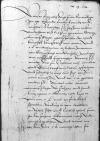Nachdem sich zwischenn unserm unnderthann und liebenn getreuenn Georg Lautenschlager (†before 1550-03-31), subject of Duke Albrecht von Hohenzollern; in 1541 Kneiphof town clerc (HARTMANN 1525-1550, p. 399, 579)⌊Georg(en) LautenschlagerGeorg Lautenschlager (†before 1550-03-31), subject of Duke Albrecht von Hohenzollern; in 1541 Kneiphof town clerc (HARTMANN 1525-1550, p. 399, 579)⌋, / statschreiber der stadt Kneiphof (Knipawa), city in Ducal Prussia, one of three cities, which Königsberg consisted of; today in Russia, Kaliningrad Oblast⌊Kneiphoff KonigspergkKneiphof (Knipawa), city in Ducal Prussia, one of three cities, which Königsberg consisted of; today in Russia, Kaliningrad Oblast⌋ ann einem / unnd E(uer) L(ieb) unnderthanenn / etzlichenn Citizens of Braunsberg ⌊inwonernn vom BraunspergeCitizens of Braunsberg ⌋ annders theils irrungen einer erbschafft zugetragenn, / daraus sich ervolgt, / das ein ersamer Braunsberg Town Council ⌊rath / bemelter stadt BraunspergkBraunsberg Town Council ⌋ auch darein geflochtenn unnd sich etzliche ubergebene setze vor iniurienn anmassenn unnd vor E(uer) L(ieb) geortert werdenn sol. / Dieweil aber benenter Georg Lautenschlager (†before 1550-03-31), subject of Duke Albrecht von Hohenzollern; in 1541 Kneiphof town clerc (HARTMANN 1525-1550, p. 399, 579)⌊LautenschlagerGeorg Lautenschlager (†before 1550-03-31), subject of Duke Albrecht von Hohenzollern; in 1541 Kneiphof town clerc (HARTMANN 1525-1550, p. 399, 579)⌋ / der sachenn unnd hanndlung gernn abkommen wolt, / hat er unns ann E(uer) L(ieb) umb ein furbetlich schreibenn, / dardurch er vonn derselbenn ein vhelich sicher unnd cristlich geleith zuvorhar der sachenn bekommenn mocht, / undertheniglich gebethenn. / Unnd wiewol wir wissenn, / das E(uer) L(ieb) menniglichenn zur  BCz, 1606, p. 546 billigkeit gewogenn, / auch des geleits von unnotenn / so habenn wir doch / unnsern Georg Lautenschlager (†before 1550-03-31), subject of Duke Albrecht von Hohenzollern; in 1541 Kneiphof town clerc (HARTMANN 1525-1550, p. 399, 579)⌊unnderthannGeorg Lautenschlager (†before 1550-03-31), subject of Duke Albrecht von Hohenzollern; in 1541 Kneiphof town clerc (HARTMANN 1525-1550, p. 399, 579)⌋ solch sein bith / zu furderung des hanndels nit abschlagenn mogen. Ist demnach unnser freuntlich bith, / E(uer) L(ieb) wollenn umb unnsert willenn hierinnen sich nachparlich ertzeigenn / unnd bemeltem unnserm unnderthann / Georg Lautenschlager (†before 1550-03-31), subject of Duke Albrecht von Hohenzollern; in 1541 Kneiphof town clerc (HARTMANN 1525-1550, p. 399, 579)⌊Georgenn / LautenschlagerGeorg Lautenschlager (†before 1550-03-31), subject of Duke Albrecht von Hohenzollern; in 1541 Kneiphof town clerc (HARTMANN 1525-1550, p. 399, 579)⌋ / ein sicher cristlich vhelich unnd unngevert geleit fur E(uer) L(ieb) unnd derselben hidden by binding⌈[n]n hidden by binding⌉ unnderthanen / uberschickenn. / Damit der hanndlung umb sovil dester eher abgehulffenn / unnd die partenn inn ruhe unnd einigkeit kommen mochtenn. / Das sein wir gleichsfals gegenn E(uer) L(ieb) unnd dem[...] hidden by binding⌈[...][...] hidden by binding⌉ eurenn zuthun geneigt. / Wollenn auch solch[...] hidden by binding⌈[...][...] hidden by binding⌉ umb E(uer) L(ieb) freuntlich verdienen. /
BCz, 1606, p. 546 billigkeit gewogenn, / auch des geleits von unnotenn / so habenn wir doch / unnsern Georg Lautenschlager (†before 1550-03-31), subject of Duke Albrecht von Hohenzollern; in 1541 Kneiphof town clerc (HARTMANN 1525-1550, p. 399, 579)⌊unnderthannGeorg Lautenschlager (†before 1550-03-31), subject of Duke Albrecht von Hohenzollern; in 1541 Kneiphof town clerc (HARTMANN 1525-1550, p. 399, 579)⌋ solch sein bith / zu furderung des hanndels nit abschlagenn mogen. Ist demnach unnser freuntlich bith, / E(uer) L(ieb) wollenn umb unnsert willenn hierinnen sich nachparlich ertzeigenn / unnd bemeltem unnserm unnderthann / Georg Lautenschlager (†before 1550-03-31), subject of Duke Albrecht von Hohenzollern; in 1541 Kneiphof town clerc (HARTMANN 1525-1550, p. 399, 579)⌊Georgenn / LautenschlagerGeorg Lautenschlager (†before 1550-03-31), subject of Duke Albrecht von Hohenzollern; in 1541 Kneiphof town clerc (HARTMANN 1525-1550, p. 399, 579)⌋ / ein sicher cristlich vhelich unnd unngevert geleit fur E(uer) L(ieb) unnd derselben hidden by binding⌈[n]n hidden by binding⌉ unnderthanen / uberschickenn. / Damit der hanndlung umb sovil dester eher abgehulffenn / unnd die partenn inn ruhe unnd einigkeit kommen mochtenn. / Das sein wir gleichsfals gegenn E(uer) L(ieb) unnd dem[...] hidden by binding⌈[...][...] hidden by binding⌉ eurenn zuthun geneigt. / Wollenn auch solch[...] hidden by binding⌈[...][...] hidden by binding⌉ umb E(uer) L(ieb) freuntlich verdienen. /
 BCz, 1606, p. 546 billigkeit gewogenn, / auch des geleits von unnotenn / so habenn wir doch / unnsern
BCz, 1606, p. 546 billigkeit gewogenn, / auch des geleits von unnotenn / so habenn wir doch / unnsern 

